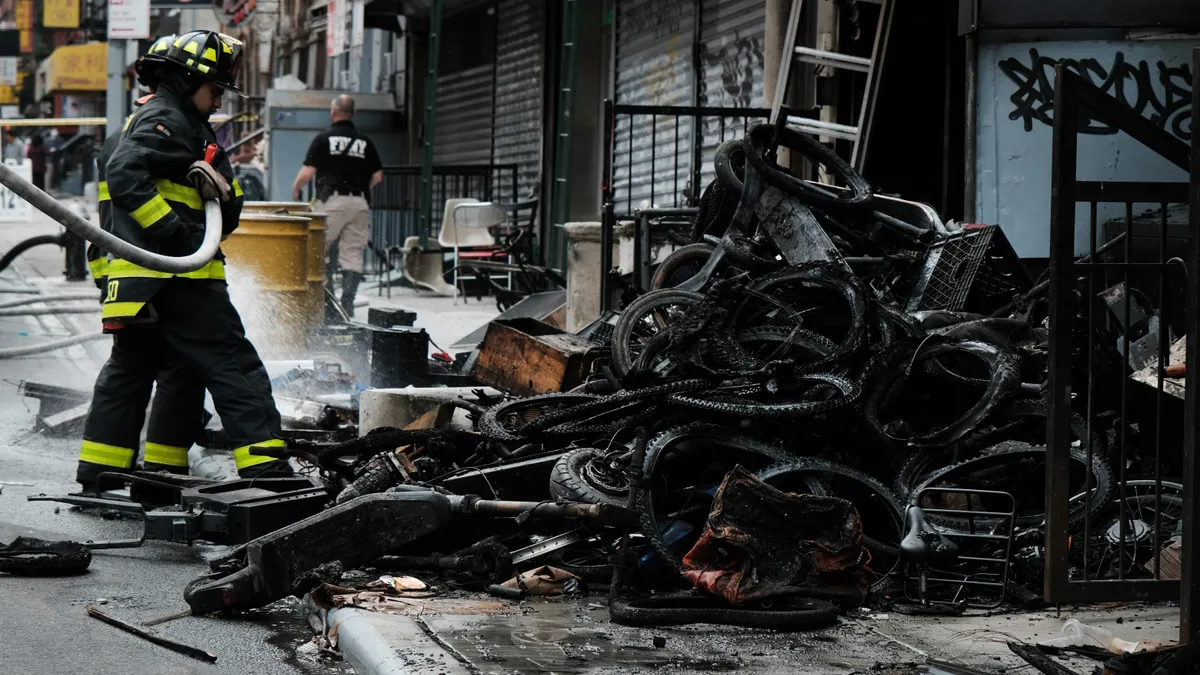Dive Brief:
- A bill adding rechargeable e-mobility batteries for scooters and e-bikes to New York’s battery stewardship program passed the state Assembly on Tuesday, just hours before the end of the legislative session. It will now be sent to Gov. Kathy Hochul’s desk for signature.
- The bill is meant to update the existing rechargeable battery EPR law to add the e-mobility devices, which lawmakers say are responsible for serious fires. The state’s original law was established in 2010 before e-bikes and e-scooters were common.
- Meanwhile, in neighboring Connecticut, Gov. Ned Lamont last week signed an EPR for batteries law. It covers both rechargeable batteries for e-mobility devices as well as consumer batteries such as those in laptops and other electronics.
Dive Insight:
The rise in popularity of e-bikes and e-scooters has also given rise to increased fires from these devices across the country, and local officials have been especially concerned with fires occurring in residential buildings and homes.
Waste and recycling industry groups, such as the National Waste & Recycling Association, have also broadly supported battery EPR programs and other safety improvements to address these fires in their facilities.
New York already has a law prohibiting rechargeable battery disposal. Assemblymember Deborah Glick, who sponsored the new bill, said the state’s existing EPR program needed an update to explicitly list e-mobility batteries in the program and define them as rechargeable. A similar bill passed the state Senate last year but failed to move in the Assembly before the session ended.
The updated bill calls for manufacturers of e-bike and e-scooter batteries to participate in an approved EPR plan that provides “for the safe and prompt collection and disposal” of such batteries by certain retailers and government agencies.
Retailers that handle the batteries would have to coordinate with manufacturers to regularly remove the batteries from their locations, and they’d be required to educate employees about proper handling and emergency procedures in case of a fire. Call2Recycle is the designated stewardship organization in New York for collecting and recycling these batteries.
The bill faced opposition from some lawmakers who said the EPR update hadn’t been properly vetted by local fire officials. State Assemblymember Michael Durso said during the vote on Tuesday that he had at one time been among the sponsors of the bill, but ultimately he voted against it because it didn’t adequately address how to handle batteries stored in mixed-use buildings.
Glick said an amendment to the bill calls for the rulemaking process to specifically include input and consultation from the state’s Office of Fire Prevention and Control, as well as emergency services and members of the New York City Fire Department.
The current law includes a provision allowing New York City and other cities that have over 1 million residents to enforce the law in their jurisdictions. Scott Cassel, CEO of the Product Stewardship Institute, noted in an email that it “provides greater control to eliminate battery fires that have plagued the city.” PSI supported the bill.
Cassel said the bill is a “meaningful step forward in addressing lithium-ion battery hazards,” but New York’s law does not yet cover single-use batteries.
Meanwhile, Connecticut is the latest state to adopt a comprehensive EPR for batteries law, which covers a wider range of products than New York’s.
Under the new law in Connecticut, producers of certain batteries must join a battery stewardship program to fund a recycling system in the state and manage the transportation and handling of such batteries at end of life. The program will launch on Jan. 1, 2027, with producers expected to submit a stewardship plan to the state a year earlier, on Jan. 1, 2026.
The stewardship program must also provide free, convenient drop-off locations for batteries around the state. It also must develop a public education and outreach program about safe battery disposal and collection options.
“This law is a big win for the environment, public health, and municipalities across Connecticut,” said Tom Metzner, environmental analyst at the state’s Department of Energy & Environmental Protection, in a statement. “We’re proud to be part of a national shift toward producer-funded solutions that reduce battery waste and fire risk.”
PSI, which helped craft the bill in Connecticut, advocates for bills that cover a wide range of batteries within their programs. Connecticut’s law follows similar battery EPR laws as in Vermont, California and Washington, which cover both single-use and rechargeable batteries, Cassel said.
Other states also approved battery EPR laws this year. Nebraska adopted a stewardship program for medium-format batteries in May, while Colorado adopted an EPR program covering a wide range of batteries earlier in June.
This story has been updated to reflect that the current New York battery law does not yet cover single-use batteries. New York’s rechargeable battery EPR law allows cities of 1 million residents or more to enforce the law in their jurisdictions.











